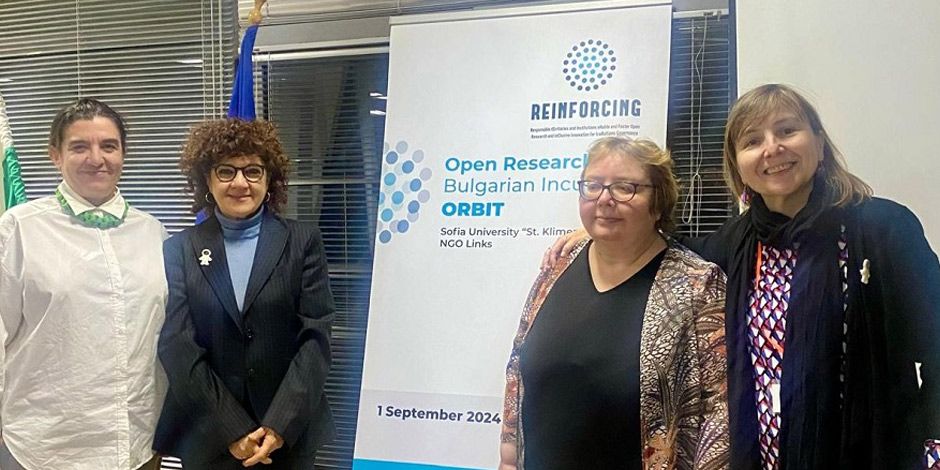
Skills4EOSC at the Orbit Workshop and Winter School in Sofia
On February 4-5, 2025, Sara Di Giorgio and Eva Méndez of Skills4EOSC took part in key initiatives organised by the ORBIT Project in Sofia, Bulgaria, to strengthen Open Science skills and practices among researchers at different career stages. Their participation also focused on raising awareness of the importance of training for developing new competencies essential to making Open Science a reality and presenting the work carried out by Skills4EOSC in this field.
Workshop for Experienced Researchers – Open Science and FAIR Data
The event started on the morning of February 4 with a Workshop for Experienced Researchers at Sofia University St. Kliment Ohridski Mirror Hall. The session was designed to introduce Open Science principles to senior researchers, helping them navigate the evolving research landscape.
Sara Di Giorgio opened the technical discussions with her talk on "Open Science Introduction and Skills Landscape," presenting the Skills4EOSC main outcomes and outlining that Skills4EOSC represents a valuable opportunity by providing operational support for building up a competence centre and training master trainers in Bulgaria.
Eva Méndez contributed with a "FAIR Data and FAIR by Design" session emphasising the importance of data findability, accessibility, interoperability, and reusability (FAIR principles). Her presentation provided researchers with practical insights into how to make their datasets FAIR from the outset.
The workshop also featured contributions from:
- Milena Dobreva (University of Strathclyde, Scotland, UK), who presented the importance of open data sharing,
- Peter Stanchev (Kettering University, USA), spoke about curation and data management strategies.
The Vice Rector of Sofia University Acad. Prof. Tony Spassov and of Dr Milena Damyanova, the Director of the Science Directorate of the Ministry of Education and Science who both delivered welcome addresses to the forum, confirmed the goodwill to find ways to support more engagement with open science both on the national and institutional levels.
Winter School 2025 – Training Early-Career Researchers
On the afternoon of February 4, the Winter School 2025 officially began at the Bankya Palace Hotel, bringing together 14 PhD students and early-career researchers for a three-day immersive program on Open Science.
Sara Di Giorgio delivered an extended session on "Open Science Introduction and Skills Landscape," introducing participants to the foundational concepts and policies shaping Open Science in Europe. Following her presentation, attendees engaged in a hands-on activity, analysing the Data Steward Minimum Viable Skillset elaborated by Skills4EOSC.
On February 5, Eva Méndez led an in-depth session on FAIR data, where participants explored practical applications of FAIR principles and how to integrate them into their research workflows. The day's agenda also included interactive sessions on:
- Skills for PhD students (Milena Dobreva),
- Open Access publishing (Peter Stanchev),
- Citizen Science (Teodora Gandova).
The Winter School continued until February 7, covering topics such as AI tools in Open Science, legal frameworks for secondary publications, science communication, and individual skills assessment. An essential contribution of the school was the launch of an open science self-assessment tool, which was developed and presented by Dr Albena Antonova from Sofia University. All school participants will have the opportunity to join a mentorship programme, and their progress will be monitored. The combination of a winter school and a mentorship programme aims to achieve immersive experiential learning, which will create a long-lasting appetite and skills for engaging with open science among some of the next-generation researchers in Bulgaria.
ORBIT – Open Research Incubator in Bulgaria
The Winter School 2025 was organised as part of the ORBIT – Open Research Bulgarian Incubator project, funded by a cascading grant of REINFORCING project supported by the Horizon Europe program. This initiative aims to develop Open Science capacities in Bulgaria by providing researchers with high-quality training and mentorship opportunities.
The ORBIT project is a joint initiative between the Centre for Information Society Technologies (CIST), Sofia University "St. Kliment Ohridski", and the NGO Links Association. Its goal is to support the development of Open and Responsible Science in Bulgaria by fostering collaboration between researchers, institutions, and society.
Following the adoption of Bulgaria’s new Research Act (May 2024), which establishes Open Science as a core research principle, the country faces significant challenges in implementation. ORBIT aims to bridge this gap by engaging young researchers, experienced scientists, universities, public authorities, businesses, NGOs, and citizens. The project works closely with Bulgaria’s Open Science Working Group at the Ministry of Education and Science to drive institutional change.
ORBIT focuses on strengthening Open Science practices in Bulgaria by:
- Developing a national vision for Open and Responsible Research and Innovation (ORRI) through co-creation with key stakeholders.
- Training young researchers and PhD students to apply Open Science methodologies and tools.
- Promoting Open Access publishing, FAIR data, open methodologies, and Citizen Science while studying public attitudes towards Open Science.
- Creating practical resources, including a researcher’s guide and a self-assessment questionnaire, to facilitate Open Science adoption.
- Establishing a Laboratory for Open Research at Sofia University, ensuring long-term sustainability and knowledge-sharing.
The ORBIT project is part of the second cascading call of the REINFORCING project which, aimed to strengthen open and responsible research and innovation in the Balkan region and funded a cluster of initiatives fostering regional collaboration in Open Science.







 Telegram
Telegram